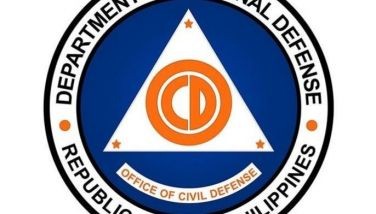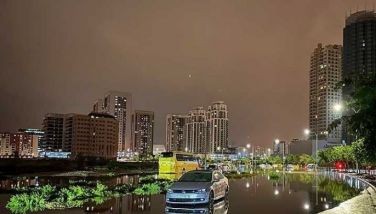Chinese construction on islands to continue ASEAN, US, Japan step up pressure on China
KUALA LUMPUR – China said yesterday it has finished its land reclamation work in the South China Sea and West Philippine Sea but would press on with plans for construction on the newly created islands.
Beijing’s island building activities have brought growing condemnation from its neighbors and the United States.
A Southeast Asian diplomatic source said Chinese Foreign Minister Wang Yi told his counterparts yesterday during a ministerial forum of the Association of Southeast Asian Nations (ASEAN) that construction on reclaimed lands would continue.
“China has already stopped. You look, who is building? Take a plane and look for yourself,” Wang told reporters on the sidelines of the meeting when asked about the reclamation work.
Wang said the construction projects would include lighthouses, medical and emergency rescue facilities and meteorological and marine installations, the source added.
China has sparked alarm by expanding tiny reefs in the flashpoint sea and constructing military posts on some of them to shore up its disputed territorial claims to most of the sea.
China came under mounting pressure yesterday over its land reclamation, with both the US and Japan criticizing it for militarizing the disputed waters.
US Secretary of State John Kerry raised the issue during a meeting with Wang on the sidelines of ASEAN meeting.
The annual gathering, which concludes today, also includes US, Russia and other countries from across Asia.
In a rare show of unity on dealing with China, the regional bloc demanded a halt to the Asian giant’s reclamation activities in disputed waters. The maritime issue dominated the opening of the meeting on Tuesday, with host Malaysia chiding China for refusing to have the matter discussed.
But Wang and Thai Foreign minister general Tanasak Patimapragorn said China and the ASEAN have already agreed to speed up consultations on a Code of Conduct for South China Sea.
Beijing had shown little interest in having a Code of Conduct, but in 2013 agreed to engage in “consultations” on the issue, and not full negotiations.
“Countries bordering the South China Sea should... speed up the COC consultations and actively explore preventative measures for managing maritime risks,” Wang told reporters.
Blame game
Also yesterday, the US and China clashed over who is to blame for rising tensions in the region.
In blunt but diplomatic terms, Kerry and Wang suggested that efforts to ease tensions over competing claims remained a contentious work in progress despite hopes for movement on ways to resolve them at the forum.
Kerry urged China to end provocative land reclamation projects in the South China Sea.
Wang, meanwhile, sent a strong message that those without claims, such as the US, should allow China and the other claimants to deal with them on their own.
“Secretary Kerry reiterated his concern about rising tensions over disputed claims in the South China Sea and China’s large-scale reclamation, construction and militarization of features there,” a senior State Department official told reporters.
“He encouraged China, along with the other claimants, to halt problematic actions in order to create space for diplomacy.”
Southeast Asian foreign ministers warned Tuesday after they met in Kuala Lumpur that China’s moves were raising regional tensions, with the Philippines slamming Beijing’s “unilateral and aggressive activities.”
State Minister Minoru Kiuchi, Japan’s envoy to the talks, yesterday told delegates to the forum he had “deep concern over... large-scale land reclamation, the construction of outposts and their use for military purposes,” according to a Japanese government statement.
Tokyo is locked in a confrontation of its own with Beijing over disputed islands in the East China Sea.
Beijing claims control over nearly the entire South China Sea, a key shipping route thought to hold rich oil and gas reserves.
The Philippines, Malaysia, Vietnam, and Brunei – all ASEAN members – also have various claims as does Taiwan, many of which overlap.
China’s neighbors have increasingly chafed at what is seen as mounting violations by Beijing of a regional pledge not to take actions that could stoke conflict.
Danger acknowledged
In Manila, defense spokesman Peter Galvez said the ASEAN call was an acknowledgement of the issue’s potential to erupt into a full-blown crisis.
“The ASEAN’s call to cease land reclamation in the South China Sea is a manifestation that its members are acknowledging that China’s activities are causing tensions and straining diplomatic ties,” Galvez said in a text message.
“It is actually now perceived as a crisis waiting to happen,” he added.
Galvez stressed that China’s actions would affect freedom of navigation in the region.
“Aside from the adverse impact on the environment, which will affect all nations in the area, the implications on the regional security architecture are broad and far-reaching,” he said.
“They will affect the interests of other nations that depend on freedom of flight and navigation in the area,” he added.
Foreign affairs spokesman Charles Jose said there was nothing new in China’s declaration.
“China has publicly announced some weeks back that they are stopping their reclamation work but that’s only because China has completed what they intend to accomplish in the South China Sea as far as creating artificial islands are concerned,” Jose said.
China has turned into artificial islands the Panganiban (Mischief), Zamora (Subi), Kagitingan (Fiery Cross), Kennan (Chigua), Mabini (Johnson South), Burgos (Gaven) and Calderon (Cuarteron) Reefs, which are within Philippine territory.
The Chinese were reportedly building airstrips, radar systems and military barracks on the reefs.
Former congressman and national security adviser Roilo Golez said China faces global isolation with its aggressive acts in the West Philippine Sea and South China Sea. – Pia Lee-Brago, Alexis Romero, Paolo Romero, Jaime Laude
- Latest
- Trending




























